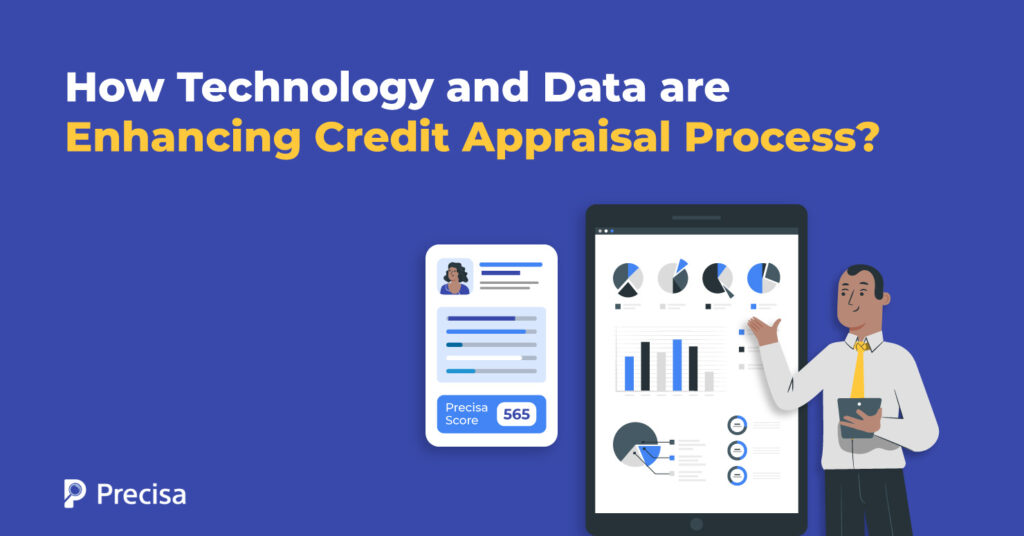Credit Appraisal Process: How Technology and Data Are Enhancing It

Accurately assessing the borrower’s creditworthiness is necessary for a lender’s long-term success and stability. It is an integral part of the lending process; accuracy and promptness are two key aspects to consider in the credit appraisal process.
Credit appraisal or credit assessment involves a comprehensive evaluation of the applicant’s credit history, financial capacity, and ability to repay their debt.
Credit appraisal is currently more than just dependent on manual data collection and assessment. Technological advancements such as automated data collection, machine learning, artificial intelligence, and big data analytics have helped lenders assess credit.
As per Statista, India has witnessed a constant decline in the gross non-performing asset (GNPA) to total advances ratio from FY 2018, when it stood at 11.18%, to FY 2023, when it fell to 3.9%.
Technology has played a crucial role in helping lenders reduce their default rates. Let us explore the role of technology and data in transforming the credit appraisal process.
Why Is Credit Appraisal Crucial for Lenders?
Lenders face the inherent risk of default when extending credit. While they cannot eliminate this risk, they can adopt measures to minimise it.
Ascertaining the borrower’s creditworthiness helps reduce the risks of Non-Performing Assets (NPA) and bad loans. NPAs and rising defaults reduce a lender’s profitability and may jeopardise its existence.
Traditionally, lenders looked at historical data in the form of credit scores and relied on human judgment or guarantors to mitigate the chance of loan defaults. While these techniques have served lenders in the past, evolving credit channels coupled with fast growth in the lending domain require more robust and modern ways of credit evaluation.
The Role of Technology and Data in Credit Appraisal Process

Integration of state-of-the-art technologies in the credit appraisal process offers enormous benefits to lenders, some of which are discussed below:
Efficient and Accurate Data Collection
Loan applicants can now use technology to submit financial documents and other relevant information without manual intervention. Manual data collection and processing require significant paperwork, are extremely time-consuming, and are prone to errors.
Technology enables the digitisation of documents, which can be verified electronically, to ascertain the authenticity and integrity of the information provided. The paperless application process facilitates speedier uploads, simplifies the process and improves accessibility.
Technology allows automated data collection from various sources, such as financial statements, bank statements, tax returns, and credit reports. Eliminating the need for manual data collection helps make the credit appraisal process more efficient and accurate.
Better Risk Assessment with Wider Data Sources
Traditionally, the credit appraisal process relied only on credit scores obtained from various credit bureaus, which are inadequate to get an accurate picture of the applicant’s credit health.
Lenders can now leverage technology to source data from multiple sources, such as utility bills and alternative sources, like cash flow analysis. The availability of a centralised data repository simplifies the credit appraisal process, helps lenders get a more comprehensive view of the applicant’s financial health, and reduces the chances of discrepancies.
Data from multiple and varied sources offers lenders a deeper understanding of the applicant’s credit health, accelerates the credit appraisal process and helps determine appropriate loan terms.
Quicker Decision Making
Automation and digital documentation help lenders access relevant information from anywhere, anytime. Multiple stakeholders can review and update documents simultaneously, regardless of physical location, enabling remote collaboration.
Lenders can use technology to assess an applicant’s creditworthiness in real time, facilitating quicker loan approvals and disbursements. Applicants do not have to wait days for loan approvals. This can significantly benefit businesses with operational difficulties due to fund shortages.
Automating repetitive tasks and workflows results in faster turnarounds and improved customer experience.
Also, employing state-of-the-art technology helps lenders automate their decision-making process using advanced algorithms, resulting in instant credit appraisals and loan disbursals.
Machine Learning and Artificial Intelligence Enhance Decision-making
Machine learning (ML) and artificial intelligence (AI) are two powerful tools that aid lenders in the credit appraisal process. ML algorithms can evaluate large volumes of data to identify patterns otherwise missed in manual scrutiny. AI helps the system adapt to and learn from past loan performance and improve accuracy.
Machine learning algorithms help predict a borrower’s creditworthiness by looking at historical credit data, loan repayment patterns and defaults.
These algorithms can identify risk factors and minimise human bias and subjectivity. AI-powered systems also help detect fraudulent loan applications by comparing data across various sources and flagging potential anomalies.
Technology-powered tools like advanced analytics help lenders make better decisions that are backed by robust data
Predictive Analytics
Gone are the days of solely relying on credit scores. Predictive analytics, powered by machine learning, analyses vast datasets to forecast a borrower’s future creditworthiness.
This translates to lenders being able to identify promising borrowers who might not have a traditional credit history and personalise loan terms based on individual risk profiles.
Proactive Fraud Detection
Sophisticated algorithms and AI act as vigilant guardians in the credit appraisal process. By cross-referencing data from multiple sources and identifying unusual patterns in applications, these tools can flag potential fraud attempts.
This safeguards lenders from financial losses and fosters a more secure lending environment.
Automated Underwriting
Imagine a lending process that eliminates tedious paperwork and manual verification. Automated underwriting leverages technology to streamline tasks like income verification and document review.
As a result, loan officers are freed from repetitive work, allowing them to focus on personalised client interaction and complex cases. This expedites the loan approval process and allows for a more human touch where it matters most.
To Sum It Up
The credit appraisal process, a critical step in the lending lifecycle, helps financial institutions mitigate their credit risk. Technology and data play a crucial role in supporting lenders in the credit evaluation process and making the decision-making process faster without compromising on its quality.
Precisa offers cloud-based analytics for finance companies that leverage the latest innovations to help lenders improve the quality of their decision-making and provide a seamless customer experience.
Sign up for a free demo today.



